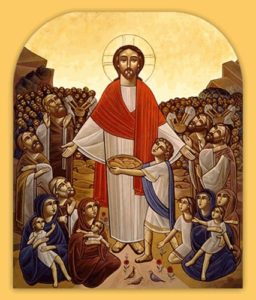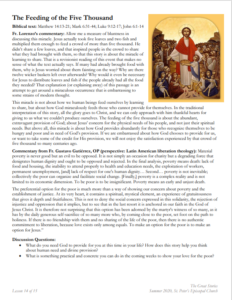
Biblical text: Matthew 14:13-21; Mark 6:31-44; Luke 9:12-17; John 6:1-14
Fr. Lorenzo’s commentary: Allow me a measure of bluntness in discussing this miracle. Jesus actually took five loaves and two fish and multiplied them enough to feed a crowd of more than five thousand. He didn’t share a few loaves, and that inspired people in the crowd to share what they had brought with them, so that this story is about the miracle of learning to share. That is a revisionist reading of this event that makes no sense of what the text actually says. If many had already brought food with them, why is Jesus worried about them fainting on the way? Why are there twelve wicker baskets left over afterwards? Why would it even be necessary for Jesus to distribute loaves and fish if the people already had all the food they needed? That explanation (or explaining away) of this passage is an attempt to get around a miraculous occurrence that is embarrassing to some strains of modern thought.
This miracle is not about how we human beings feed ourselves by learning to share, but about how God miraculously feeds those who cannot provide for themselves. In the traditional interpretation of this story, all the glory goes to Christ, and we can only approach with him thankful hearts for giving to us what we couldn’t produce ourselves. The feeding of the five thousand is about the abundant, extravagant provision of God; about Jesus’ concern for the physical needs of his people, and not just their spiritual needs. But above all, this miracle is about how God provides abundantly for those who recognize themselves to be hungry and poor and in need of God’s provision. If we are embarrassed about how God chooses to provide for us, or want to take some of the credit for His provision, we will not enjoy the satisfaction experienced by that crowd of five thousand so many centuries ago.
Commentary from Fr. Gustavo Gutiérrez, OP (perspective: Latin American liberation theology): Material poverty is never good but an evil to be opposed. It is not simply an occasion for charity but a degrading force that denigrates human dignity and ought to be opposed and rejected. In the final analysis, poverty means death: lack of food and housing, the inability to attend properly to health and education needs, the exploitation of workers, permanent unemployment, [and] lack of respect for one’s human dignity… Second… poverty is not inevitable; collectively the poor can organize and facilitate social change. [Finally,] poverty is a complex reality and is not limited to its economic dimension. To be poor is to be insignificant. Poverty means an early and unjust death.
The preferential option for the poor is much more than a way of showing our concern about poverty and the establishment of justice. At its very heart, it contains a spiritual, mystical element, an experience of gratuitousness that gives it depth and fruitfulness. This is not to deny the social concern expressed in this solidarity, the rejection of injustice and oppression that it implies, but to see that in the last resort it is anchored in our faith in the God of Jesus Christ. It is therefore not surprising that this option has been adorned by the martyr’s witness of so many, as it has by the daily generous self-sacrifice of so many more who, by coming close to the poor, set foot on the path to holiness. If there is no friendship with them and no sharing of the life of the poor, then there is no authentic commitment to liberation, because love exists only among equals. To make an option for the poor is to make an option for Jesus.”
Discussion Questions:
- What do you need God to provide for you at this time in your life? How does this story help you think about human need and divine provision?
- What is something practical and concrete you can do in the coming weeks to show your love for the poor?



Comments are closed.